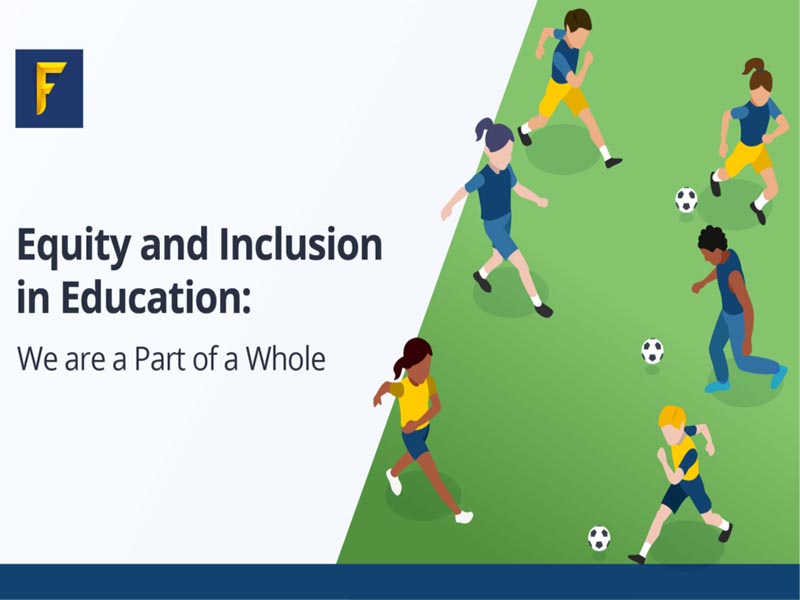Dr. Monika Dewan believes that we are all part of a whole and uses this philosophy to build equity and inclusion into her physical education courses. Check out some tips she shares for creating a relationship of trust in the classroom.
We are a part of the whole!
I am in love with this statement. It has a way deeper meaning than it seems. When we look at the creations of nature, every particle seems to be in its correct place, completing the entire picture of this Universe. We are all parts of a whole, and we are connected!
This is what I keep in mind at all times as an educator for my students and as a trainer for educators. Nature provides us with lessons of discipline and organization.
Please take care of yourself!
I gently remind all the educator colleagues across the world to please take care of yourselves. Mental health is important, along with other domains. Hence, mindfulness and meditation are strategies that will help take care of the well-being of the teachers. Once we are feeling happy and healthy, we will be able to take care of our students much better.
Equity and inclusion opportunities in education
The focus of equity and inclusion in education is that we are able to cater to the needs of all our student learners. As we know, learning is a continuum, and we, as educators, must help all students develop themselves.
I ensure I reach all my students through a friendly approach. My strategies include connecting with my students and building a relationship of trust and understanding. We develop the class expectations with student input, so they have ownership and a feeling of belonging.
Our beliefs are exhibited through child-friendly posters used in classrooms that enhance their understanding of the concepts of being respectful and treating everyone equally.
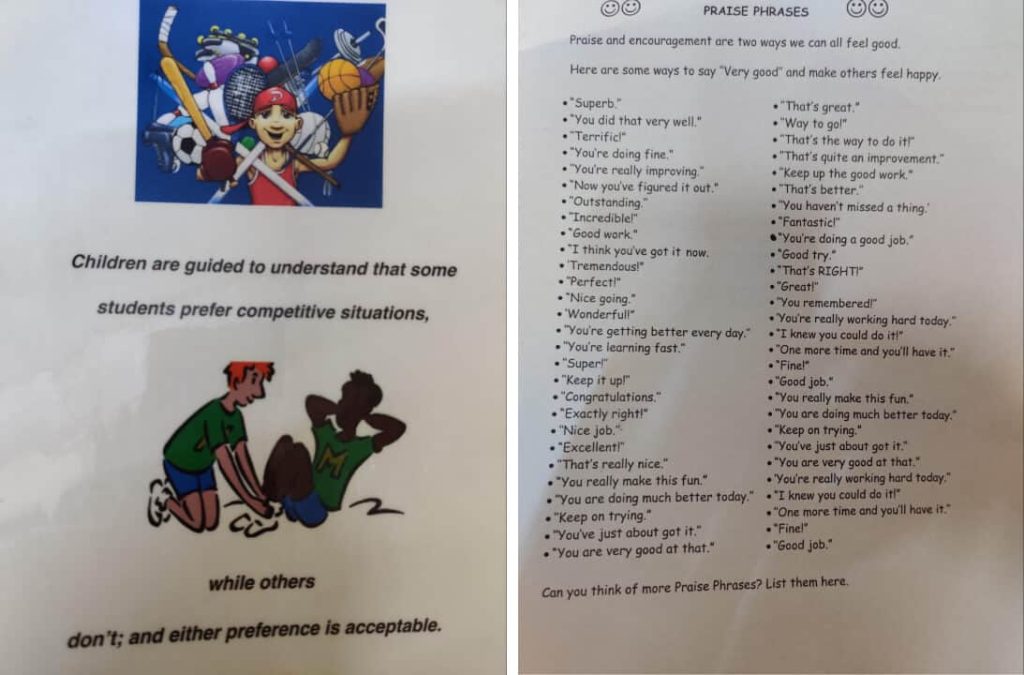
that enhance students’ understanding of being respectful and treating everyone equally.
I provide all my students leadership opportunities with choices they feel comfortable executing, and hence promoting inclusion. This ensures there is a sense of positivity flowing in my classroom.
Ensuring that all students stay respectful and responsible at all times, helps them become compassionate human beings. I encourage them to respect themselves, their peers, the equipment and the teacher.
Using Feedback & Assessments
The students are given plenty of opportunities to work with partners and in groups. They are expected to work not only with their friends, but they are encouraged to come out of their comfort zone and interact with other class members as well. Towards the culmination of the unit, we execute a blind assessment or 360 degrees evaluation where everyone gives anonymous feedback about each other. There is a self-assessment, peer assessment and teacher assessment involved. The average scores achieved are so accurate. In my experience, every assessor is honest while giving the scores, and every class member usually agrees with the ratings.
In my experience and observation, it has been the most accurate depiction of the students’ participation. They all have an equal opportunity to participate, be respectful to others, and in turn, they are developing themselves to become tolerant. They learn that when there is a difference of opinion, they should accept it gracefully or try and reach a consensus.
Below are a few images showing the rubric students use to self and peer assess, as well as a writeup of an observation of the assessment process in the classroom. As you can see in the data tables, there was a significant student improvement in student Respect & Tolerance from test 1 to test 2.
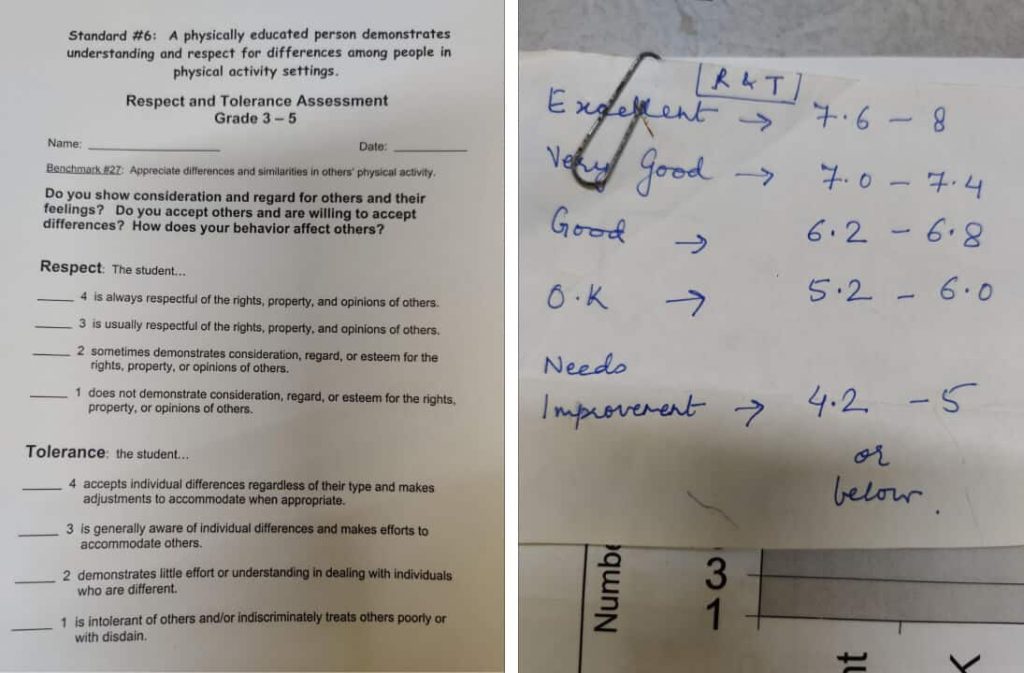
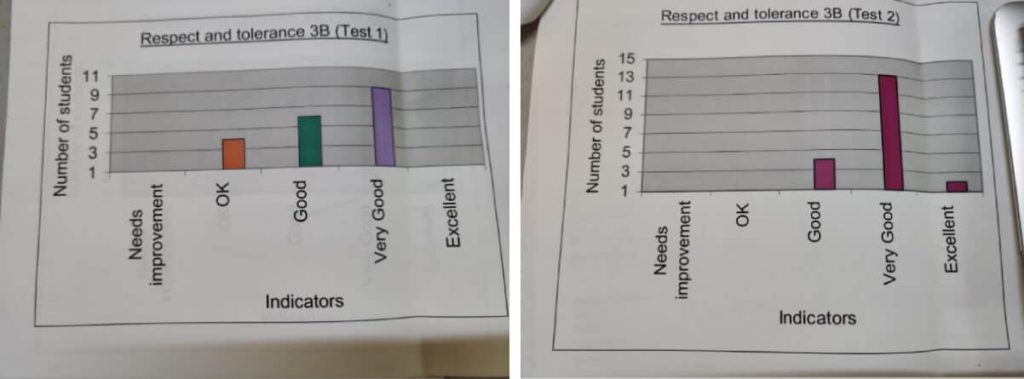
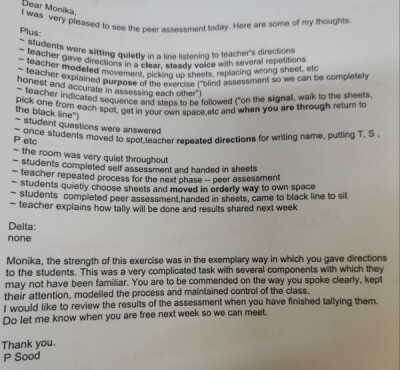
Sometimes, students can get into a tussle over trivial matters like fighting for a spot, or the color of the ball and repeated reminders of statements like, “You get what you get and you don’t get upset” are very helpful. Primarily, the focus is on having them stay self-motivated to do the right things at all times.
Every learner should be inspired to learn and grow. I encourage my students to create SMART Goals for themselves. This is applicable in Physical and Health Education classes as well. I provide my students’ opportunities to self reflect and grow in areas they identify for themselves.
We have developed a culture of compassion, empathy and care in our classes. There is zero tolerance for discrimination and indiscipline. We value every class member and treat them equally irrespective of their skill level, fitness abilities, intelligence, ethnicity, financial status, color, disability or creed. Students are nurtured in a safe environment. They are free to share their opinions. They can discuss issues in a safe and supportive learning environment. Equality in the learning process and achievement by all children, regardless of their background, is our belief.
I am happy to see my responsible, compassionate learners trust and value each other. I believe that diversity enriches us. I share these tips of learning expectations so teachers may use the shared strategies to build their learning environment and have positivity flowing in all the classrooms. Education teaches us to be humble and treat each other with humanity.
Channelize energy positively
Teaching students that come from multiple nationalities, having a common language barrier, it becomes imperative to ensure we respect and treat each other in a fair manner. Regular communication with parents and their support is very essential as well.
We have problems that come up, but we problem solve together by brainstorming possible solutions. We reach a consensus for the best possible direction to move ahead, and we carry our learning forward in a joyful manner.
My students have developed an understanding that we all have energies, and we use them positively to help, build and support. Even the peer feedback we provide is constructive! We are passionate about our learning, while we maintain the attributes such as resilience, empathy and respect for others.
Mindfulness
Mindfulness in both a virtual and in-person setting is equally important and a key aspect to be incorporated in all the lessons. It elevates the group focus and attention. Mindfulness practices are important for educators to take actions and act as a role model. We must maintain the hope, stay grounded for our young learners and always demonstrate what we expect from them. Treating all our colleagues in a justified, compassionate, empathetic and respectful manner.
There should be no factors that limit our journey of learning!
After all, we are all parts of a whole, and we are connected. Every part is important, has value and power to create a more peaceful world.

Dr.Monika Dewan
International Educator, Author, Consultant


